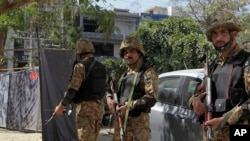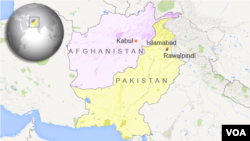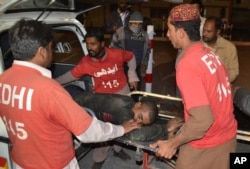Pakistan’s civilian government is pursuing a high-risk strategy in authorizing its army to conduct cross-border strikes against terrorists.
A flurry of terror attacks in the country is forcing its leaders to try to quell public anger by taking a more aggressive approach in fighting the problem, which has killed more than 125 people and shattered a relatively quiet period that has been fostered by a major military campaign.
The attacks have been linked to Islamic State and its allies, with Pakistan saying they have been instigated from Afghanistan’s side of the border. Afghanistan has blamed attacks in its territory on groups operating from Pakistan.
Pakistan also wants to be seen as an active ally in the U.S.-led war on terrorism at a critical time, with new President Donald Trump’s administration currently developing its foreign policy — including aid — in the region.
The army has just been tasked with carrying out a nationwide initiative aimed at rooting out Islamic extremists, even in areas like Punjab province that previously were considered off-limits. Pakistan’s military, which has long played a strong role in the country, is believed to have ties with some extremist groups.
Relations with Afghanistan
The decision to authorize the military to carry out missions unilaterally outside Pakistan’s territory has rankled Afghanistan at a time that both are suffering from Islamic State’s attacks, which are disruptive to both countries’ leadership.
“This is a clear-cut decision of the government, and the military is authorized to take action within the country or across the country, that where there is terrorism, they will have to take action,” said Pakistan Finance Minister Ishaq Dar.
Instead of cooperating to fight terror groups, as both sides agree they must do, the two governments are allowing the gap between them to expand.
“Both countries are faced with terrorism and both need to work together; neither can do it on its own,” said Ishaq Khan, a Pakistani security expert and retired army brigadier.
Territorial issue
There also are questions whether Pakistan’s government is going too far.
“Terrorism needs a joint approach by both the countries,” Pakistan Sen. Shahi Syed told Voice of America’s Deewa service. “Pakistan should take care of terrorists on its soil first and then go somewhere else.”
But Michael Kugalman, Asia Program deputy director and senior associate for South Asia at the Woodrow Wilson Center in Washington, said it isn’t quite that simple.
He said extremist groups are plotting attacks from Afghanistan, “But their enablers and suicide bombers are still people in Pakistan. Pakistan has an extremist environment where schools, religious leaders and some journalists promote the extremist ideologies. It provides the environment to induce suicide attackers and terrorists."
Rahmatullah Nabil, former chief of Afghanistan’s National Directorate for Security, said Pakistan is trying to play both sides by going after groups in Afghanistan. “They intend to show to the new U.S. administration that Pakistan is a victim rather than exporter of terrorism,” he said.
VOA’s Deewa and Afghan services contributed to this story.













